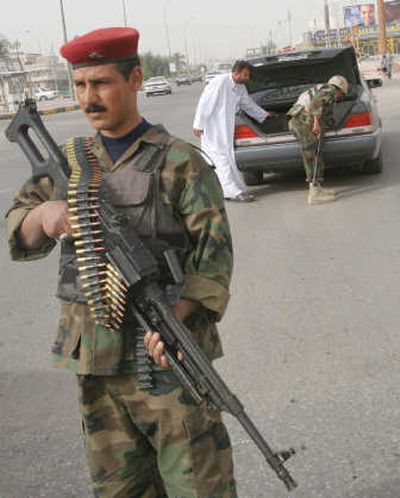Insurgent attacks reach post-surge high

BAGHDAD – Attacks against U.S. troops and Iraqi security forces soared across Baghdad in the last week of March to the highest levels since the deployment of additional U.S. troops here reached full strength last June, according to U.S. military data and analysis.
The spike in attacks, in response to an ill-prepared Iraqi government offensive in the southern city of Basra last week, underscores how the U.S. military’s hard-won security gains in Iraq remain fragile and how easily those gains can be erased.
“Last week was clearly a bad week and shows the tenuous nature of security, which is something we’ve been stressing for some time now,” Navy Rear Adm. Gregory Smith, the U.S. military’s chief spokesman, wrote in an e-mail response to questions. “Security in Iraq is not irreversible, and any number of actors can affect the level of violence if and when they choose to.”
Last week’s violence also propelled civilian deaths to levels not seen since last summer, according to Iraqi government figures. March’s death toll was 30 percent higher than February’s.
Over the week that began March 25, when the offensive began in Basra, there were 728 attacks against U.S. coalition forces, Iraqi security forces and civilians across Iraq, according to U.S. military data obtained by the Washington Post. Of those, 430 – or almost 60 percent of the attacks – occurred in Baghdad, the major focus of last year’s buildup of 30,000 additional U.S. troops. The forces have begun to withdraw, and the rest are to be gone by the end of July.
In comparison, the average weekly attack rate in Baghdad last June was 326 attacks, according to U.S. military statistics.
By Monday, a day after Shiite cleric Muqtada al-Sadr ordered his Mahdi Army militiamen to lay down their arms, the attacks quickly subsided close to levels seen before the government offensive. On March 23 and March 24, the two days before the offensive began, there were, respectively, 42 and 38 attacks across Iraq. On each of those days, there were only 14 attacks in Baghdad. Over the next few days, attacks in the capital spiked to as many as six times that number.
The rapid containment of the fighting suggests that the surge of U.S. forces is but one factor in bringing down violence in Iraq and that in Shiite areas, a cease-fire imposed by al-Sadr on his militiamen last August may be more significant.
The reduction in violence across Iraq on Monday, which appeared to continue Tuesday, also highlights the power al-Sadr wields on Iraq’s streets and the control he exerts over much of his militia, despite assertions by U.S. military commanders that the cleric’s movement has been weakened by the buildup.
The figures and analysis offer more evidence of how swiftly U.S. forces were drawn into a power struggle unfolding between al-Sadr and rival Shiite groups that lead Iraq’s government, mainly Prime Minister Nouri al-Maliki’s Dawa party and the Islamic Supreme Council of Iraq, led by Abdul Aziz al-Hakim.
In interviews, some Mahdi Army commanders and fighters said they saw the Basra offensive as an opportunity to attack U.S. troops in Baghdad after nearly a year of standing down under al-Sadr’s orders.
“It was a big happiness,” said Khadim al-Saadi, a Mahdi Army leader in Sadr City, where many of the fiercest battles against U.S. troops occurred. “The main reason for the degradation of our lives is the presence of the occupiers on our land.”
A senior U.S. military official said, “This one-week spike in violence and the subsequent decrease, it has everything to do with Sadr and his control over mainstream JAM,” using a military acronym for the Mahdi Army. He said Iran also played a role in brokering the deal between al-Sadr and the Iraqi government that led to al-Sadr’s statement ordering his men to lay down their arms.